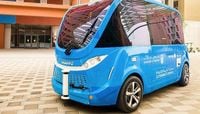The UAE has emerged as a global leader in autonomous vehicle innovation, according to a report from Arthur D. Little. The Emirati government is transforming UAE cities into centers for the future of transportation. Autonomous vehicles promise to reshape urban landscapes and mobility, indicating a transformative shift in transportation.
Recognizing this potential, the UAE is actively positioning itself at the forefront of the autonomous vehicle sector. However, despite its advancements, scaling autonomous vehicle technology remains a challenge. For these innovative services to flourish, cities must navigate complex infrastructural changes, regulatory issues, and associated costs with integrating autonomous vehicles.
In its quest for a new mobility ecosystem with self-driving vehicles in mind, the UAE has initiated several successful pilot programs. “The UAE’s achievements in autonomous mobility reflect its vision of blending innovation with implementation success,” said Samir Imran, a partner at Arthur D. Little. “It highlights how forward-thinking regulations and investments in infrastructure are critical to creating a future-ready mobility ecosystem.”
WeRide, an autonomous vehicle technology company operating in the UAE, has also made significant strides. In 2024, WeRide collaborated with Uber to launch a robotaxi service in Abu Dhabi, marking a historic milestone as the world’s first of its kind. “The stability and reliability of the autonomous driving system and integrating software and hardware require the joint efforts of participants with different roles in the industry chain,” said Tony Han, CEO of WeRide. “In particular, multi-party collaboration is required in the early stage of vehicle design.”
Meanwhile, Dubai and Abu Dhabi have established themselves as testing grounds for autonomous vehicle technology. Recent partnerships like that with American self-driving car company Cruise have illustrated this trend, introducing their own robotaxi pilot programs. “Dubai and Abu Dhabi have established themselves as living laboratories for autonomous mobility,” remarked Hassan Khairat, principal at Arthur D. Little.
With its focus on piloting new technologies and building partnerships with global innovators, the UAE ensures its leadership in shaping the future of transport. Moreover, developments around autonomous buses and trucks are being anticipated as potential game changers to drastically reduce operational costs and curb congestion in urban areas.
The rise of the autonomous mobility sector is expected to bring substantial economic and environmental benefits to the UAE. Notably, self-driving vehicle solutions might reduce traffic-related delays by as much as 60%, aiding the nation's pursuit of long-term sustainability goals. While the UAE is emerging as a leader in driverless vehicle adoption on the consumer level, American technology giants and automotive manufacturers like Waymo and Tesla have long led the charge in autonomous driving research and development efforts.
The burgeoning interest in data centers has also come to the forefront in the UAE, marking another stride toward becoming a technological hub. A groundbreaking agreement between the UAE and France aims to develop a 1-gigawatt AI data centre, valued between $30 and $50 billion. This deal was announced during a recent meeting between French President Macron and UAE President Sheikh Mohamed bin Zayed Al Nahyan.
This partnership addresses the growing demand for AI and illustrates the importance of robust data infrastructures. By channeling investments into AI research, chip technology, talent development, and secure data infrastructures, the UAE and France are not only constructing physical facilities but are crafting the future landscape of AI innovation worldwide.
In alignment with the UAE's Vision 2031, which aims to position the nation as a leading global partner and economic hub, this collaborative investment in AI infrastructure seeks to unify innovation across all sectors of society. The initiative now becomes part of a broader vision where the UAE aspires to raise its GDP from AED 1.49 trillion to AED 3 trillion by integrating AI thoroughly into its economy.
As the demand for AI-ready data centers is surging, projected to grow up to 22% annually until 2030, with an expected reach of 219 gigawatts, the partnership between UAE and France comes at a pivotal moment. By 2030, 70% of data centers are anticipated to support advanced AI workloads, signifying a major transformation in data infrastructure.
The AI infrastructure market, valued at $23.5 billion in 2021, is forecasted to grow exponentially to $309.4 billion by 2031. This remarkable growth underscores the emerging need for robust AI ecosystems that can drive innovation and foster economic diversification.
With this collaboration, the UAE and France are showcasing their commitment to advancing AI adoption and positioning themselves as pioneers on the global stage. Together, they are charting a course towards a future propelling innovation via collaboration, foresight, and technological sovereignty.






